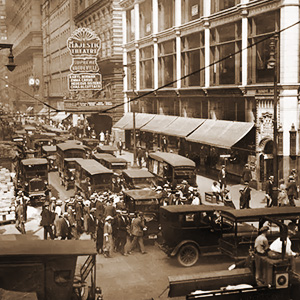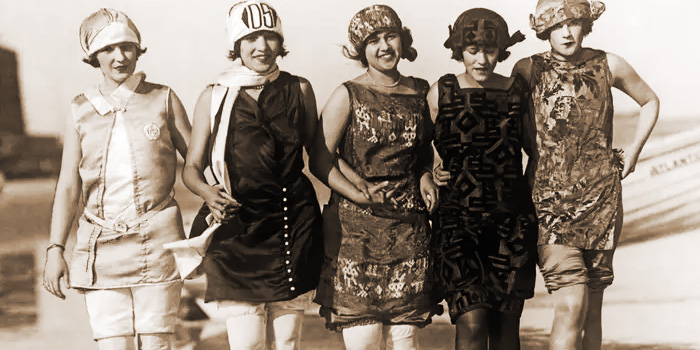Retrospective 1924
The year 1924 embodied a period of transition and significant transformation on a global scale, marked by effervescence in the cultural, scientific and social spheres.
Politics
The year 1924 stood out for the complexity of its political context, marked by post-conflict reconstruction, the evolution of political systems, and the aspiration to lasting stability in a world that was still fragile and in the throes of change.
- In the Soviet Union, Joseph Stalin's ascension to the country's helm after Lenin's death marked a significant turning point, accelerating the transformation of the communist regime.
- This era also saw the emergence of key authoritarian figures such as Adolf Hitler and Benito Mussolini, whose influence redefined international politics for decades to come.
- The year was also characterized by the establishment of authoritarian regimes, such as that of Primo de Rivera in Spain, and by democratic transitions, such as the proclamation of the Republic in Greece, reflecting the diversity of political responses to the tensions of the post-First World War era.
- In the United States, the death of Woodrow Wilson served as a reminder of his impact on the international scene, notably through his League of Nations initiative, despite the challenges posed by post-war tensions.
- The Dawes Plan, drawn up in 1924, played a crucial role in reorganizing German war debts and stabilizing the German economy, thus contributing to European peace and reconstruction.
Economy
The economic evolution of this era presents a varied picture, with distinct dynamics across the globe. Thus, the period was marked by a contrast between recovery and growth in some countries and economic challenges in others, while at the same time being an era of technological progress and cultural expansion.
Germany experienced a remarkable economic renaissance thanks to the implementation of the Dawes Plan, which stabilized its currency and boosted its economy. By contrast, France faced economic difficulties. In the United States, this period was synonymous with prosperity, famously known as the "Roaring Twenties", characterized by sustained economic growth, technological advances and cultural proliferation.
In 1924, the world witnessed a significant economic recovery from the upheavals of the First World War. Industrialization gained momentum, transforming work, production and exchange on a global scale. This era saw the emergence and consolidation of new industries, notably the automobile and broadcasting, laying the foundations of the modern economy.
Art and literature
This year was distinguished by its creative effervescence and cultural diversity, illustrating the wealth of productions in all artistic fields, from literature to film, music and fine art, all exploring the complexity of human experience in a changing world.
Among the landmark works, Thomas Mann's "The Magic Mountain" stood out for its exploration of the human experience through the prism of illness and time in a Swiss sanatorium, while André Breton laid the foundations of Surrealism with "The Surrealist Manifesto", seeking to liberate the expression of the unconscious.
Musically, George Gershwin fused jazz and classical music in "Rhapsody in Blue", a turning point that symbolized the acceptance of jazz in traditional concert halls and marked the emergence of a new musical era.
The year also saw significant contributions in cinema, with Buster Keaton's "Sherlock Jr.", a masterpiece of silent cinema that combines humor, technical innovation and visual storytelling. In addition, the German Expressionist movement continued to influence various disciplines, offering a subjective and emotional vision of the world.
Sports
In 1924, Paris hosted the Summer Olympic Games, while Chamonix-Mont-Blanc was the scene of the first Winter Olympic Games, marking a landmark year for international sport. These events not only reinforced the spirit of competition and excellence, but also promoted the values of sportsmanship, international friendship and peace between nations, underlining the importance of the modern Olympic movement.
Among the highlights of the year, the performances of Paavo Nurmi, the "Flying Finn", who dominated the long-distance races, and Jack Dempsey, the emblematic figure of boxing, captivated the world, embodying the spirit of excellence and competition.
Quiz questions preview
-
Who was Italy's head of government in 1924?
Benito Mussolini | Emilio De Bono | Francisco Franco | Cesare Maria De Vecchi -
Born on September 30, he is the author of "Breakfast at Tiffany's" and an important figure in 20th-century literature,
Truman Capote | Tennessee Williams | Gore Vidal | Jack Dunphy -
Which city organized the first Winter Olympics in 1924?
Chamonix-Mont-Blanc | Gérardmer | St. Moritz | Lake Placid -
This company produced around half the world's automobiles in 1924.
BMW AG | General Motors | Chrysler Corporation | Ford Motor Company -
Which hominid fossil was first discovered at the Taung site in South Africa?
Neanderthal | Australopithecus | Paranthropus | Homo Erectus


